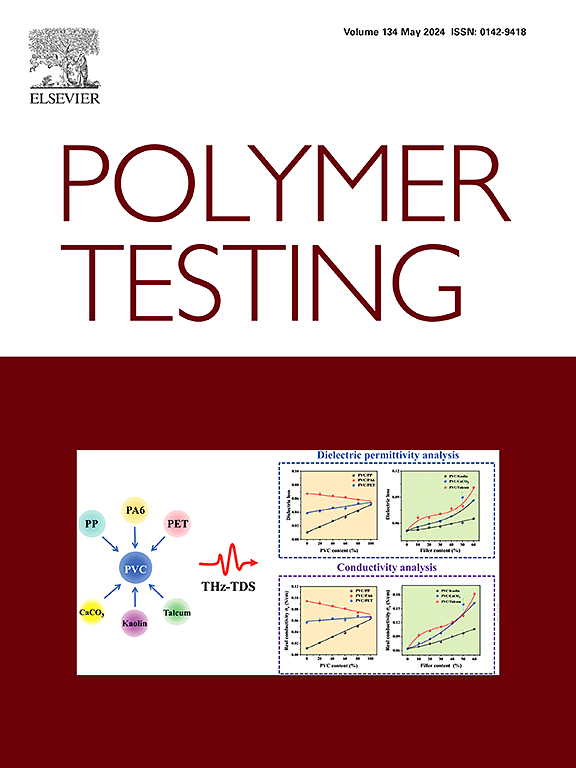Improving mesophilic anaerobic digestion of compostable packaging through efficient and versatile thermo-alkaline pre-treatment
IF 6
2区 材料科学
Q1 MATERIALS SCIENCE, CHARACTERIZATION & TESTING
引用次数: 0
Abstract
In the current European regulatory context, which requires its Member States to collect biowaste separately with a view to its organic recovery, the co-processing of compostable food packaging with biowaste by mesophilic anaerobic digestion (AD) offers the dual opportunity of promoting its conversion into biogas while reducing plastic contamination of the environment. However, most packaging items on the market - particularly those made from poly(butylene adipate-co-terephthalate) (PBAT), polylactic acid (PLA) and polybutylene succinate (PBS) - show poor biodegradability under mesophilic AD conditions. To overcome this limitation, thermo-alkaline pre-treatments conditions were carried out to hydrolyze the most resistant polymers and improve their digestibility during AD. As PBAT is the most recalcitrant, the pre-treatment conditions were first optimized using pure PBAT, before extending the application to various compostable commercial items, including bags and coffee capsules. Optimal pre-treatment conditions (3 M KOH at 70 °C for 4 h) allowed for the effective solubilization of all the items tested. As a result, Biochemical Methane Potentials (BMP) were significantly increased with improvements ranging from 2 to 3 times for bags and 1.4 to 17 times for coffee capsules, even though they contained PBAT, PLA or PBS. By sufficiently reducing the molecular weight of recalcitrant polymers so that they can be assimilated by microorganisms, this pre-treatment has demonstrated its ability to enable their biodegradation in mesophilic AD. This versatile and universal pre-treatment approach offers a promising solution recovering biowaste with compostable packaging by converting them into methane while improving the quality of AD digestates.
通过高效和通用的热碱性预处理,改善可堆肥包装的中温厌氧消化
在目前的欧洲法规背景下,要求其成员国分开收集生物废物,以期其有机回收,通过中嗜氧厌氧消化(AD)将可堆肥食品包装与生物废物共同处理提供了双重机会,促进其转化为沼气,同时减少塑料对环境的污染。然而,市场上的大多数包装项目-特别是由聚己二酸丁二酯(PBAT),聚乳酸(PLA)和聚丁二酸丁二酯(PBS)制成的-在中温AD条件下表现出较差的生物降解性。为了克服这一限制,采用热碱性预处理条件水解最耐药的聚合物并提高其在AD期间的消化率。由于PBAT是最顽固的,因此首先使用纯PBAT优化预处理条件,然后将其应用于各种可堆肥的商业物品,包括袋子和咖啡胶囊。最佳预处理条件(3 M KOH, 70°C, 4小时)允许所有测试项目的有效溶解。结果表明,即使含有PBAT、PLA或PBS,咖啡袋的生化甲烷势(BMP)也显著增加,改善幅度为2至3倍,咖啡胶囊的改善幅度为1.4至17倍。通过充分降低顽固性聚合物的分子量,使其能够被微生物吸收,这种预处理已经证明了其在中温性AD中的生物降解能力。这种多功能和通用的预处理方法提供了一个有前途的解决方案,通过将可堆肥包装的生物废物转化为甲烷,同时提高AD消化物的质量。
本文章由计算机程序翻译,如有差异,请以英文原文为准。
求助全文
约1分钟内获得全文
求助全文
来源期刊

Polymer Testing
工程技术-材料科学:表征与测试
CiteScore
10.70
自引率
5.90%
发文量
328
审稿时长
44 days
期刊介绍:
Polymer Testing focuses on the testing, analysis and characterization of polymer materials, including both synthetic and natural or biobased polymers. Novel testing methods and the testing of novel polymeric materials in bulk, solution and dispersion is covered. In addition, we welcome the submission of the testing of polymeric materials for a wide range of applications and industrial products as well as nanoscale characterization.
The scope includes but is not limited to the following main topics:
Novel testing methods and Chemical analysis
• mechanical, thermal, electrical, chemical, imaging, spectroscopy, scattering and rheology
Physical properties and behaviour of novel polymer systems
• nanoscale properties, morphology, transport properties
Degradation and recycling of polymeric materials when combined with novel testing or characterization methods
• degradation, biodegradation, ageing and fire retardancy
Modelling and Simulation work will be only considered when it is linked to new or previously published experimental results.
 求助内容:
求助内容: 应助结果提醒方式:
应助结果提醒方式:


